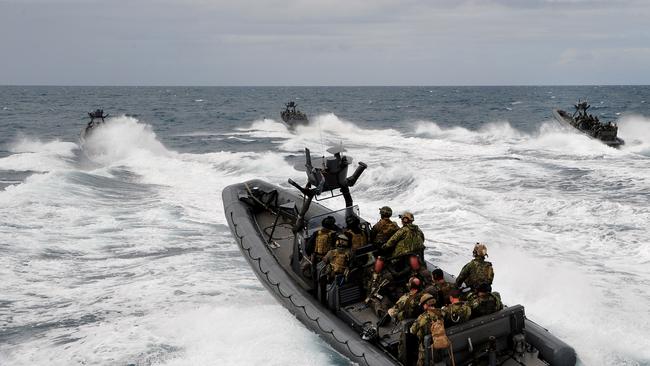NT ‘could be a forward operating base for ADF’
The worst pandemic in a century bookends a wider set of national security challenges that are shaking up entrenched habits and assumptions.

Great power rivalry is at levels unseen since the Cold War and the destabilising consequences are rippling through Australia’s maritime front yard to Darwin’s north. The worst pandemic in a century bookends a wider set of national security challenges that are shaking up entrenched habits and assumptions, forcing governments everywhere to rethink their strategies and operating models.
The dangers are evident and multiplying. No longer benign, Australia’s security environment has deteriorated markedly.
This more troubling strategic outlook is driving Darwin’s determination to reposition the Northern Territory as the indispensable enabler of Australia’s more regionally focused defence and national security strategy.
Revealing the contours of a forgotten reality, the winds of change bring a once in a generation opportunity for the NT to reimagine itself as a bulwark against external attack, a high-value alliance asset and a forward operating base for the Australian Defence Force and other national security agencies.
With the renewed national focus on defending Australia from threats to the stability of our immediate neighbourhood, the NT is set to become the key northern hub for continental defence and the projection of military power in a way that has not been contemplated for nearly 80 years. But this can only be realised by enlarging the NT’s industrial base to develop fit-for-purpose support infrastructure for the ADF with a capacity to surge for high intensity operations and training. The NT Government can play its part by providing an accommodating investment environment and strong political leadership, working collaboratively with Canberra.
Three other strategic trends have reinforced the NT’s defence and national security value.
First, after seven years of bullish rhetoric but precious little action, the US pivot to the Pacific has regained momentum which is unlikely to be reversed regardless of who wins the presidential election. This has heightened the importance of the NT for the US military as a force multiplier, training destination and logistics provider. Expect to see an increase in the frequency and diversity of US military deployments to the NT in the form of rotations, training and joint exercises with the ADF.

Second, the desire for greater self reliance, national resilience and security is driving both economic and strategic policy. This will open up opportunities for the NT economy as Canberra now accepts that there is a cost premium for greater independence and sovereign capability. The new national interest approach is evident in the more supportive environment for investment in strategic sectors of the economy such as energy and rare earths, of which the NT has an abundance.
Third, as security challenges have mounted, Darwin has become an important headquarters and operational centre for the agencies which make up the expanding national security community. The Department of Home Affairs, which has overall responsibility for immigration, customs and domestic security, sees the NT as a vital part of the shield which protects the country from drug trafficking, cyber attacks, illegal fishing, arms smuggling, piracy and terrorism. Operational agencies, such as Maritime Border Command and the Australian Border Force, have a big footprint in the NT and significant numbers of ships, aircraft and people under their command to enforce Australian law across vast tracts of the country’s northern land and sea borders.
If the stars are in rare alignment, capitalising on the opportunities they present will require the NT to be proactive, more engaged with the region, and willing to make the business of defence and national security the foundation stone of a new, smart economy. This shouldn’t be insuperable because the Top End’s abundant space, tropical climate, natural resources, developing infrastructure and proximity to Asia are attractive assets for regional defence forces and national security agencies.
The NT’s critical minerals, training ranges and budding space capabilities are illustrative. Critical minerals, including rare earths, are crucial for defence and the global economy. Developing a critical minerals industry has become a national priority and the NT is well placed to participate by providing high-performance metals derived from rare earths. These are essential for many hi-tech defence systems, including our F-35 Joint Strike Fighters, each of which contains 417kg of rare earth elements.
A modest investment in the NT’s unique training ranges could turn them into a world class defence training and exercise complex highly attractive to regional defence forces which find it difficult to train and exercise in densely populated Asia. The ability to launch satellites on demand from the Gove Peninsula will be a game changer for the ADF and the national security community.
Realising this potential will take hard work, political staying power, significant investment and serious stakeholder engagement. Stars are slow moving celestial bodies. If this opportunity is missed, the next favourable alignment may not come for a very long time.
Alan Dupont is the Northern Territory Defence and National Security Advocate.
